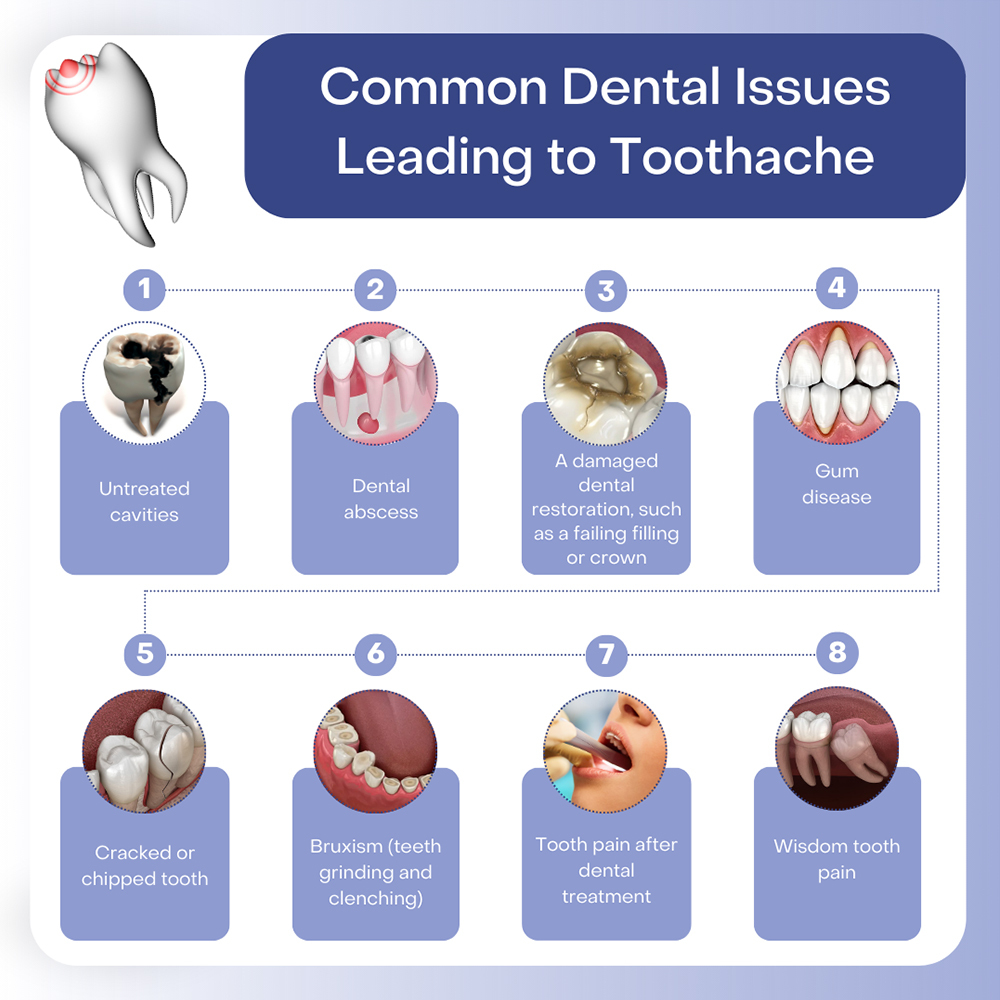Table of contents
Some temporary situations can cause toothache, but more serious tooth pain needs professional dental care.
A tooth pain or toothache is when a tooth feels painful, or there is pain around the tooth. Some minor tooth pain problems are easily treated at home and quickly resolved, but others, like tooth infections, will not improve without professional dental care.
Tooth pain can vary depending on the cause, but symptoms can include the following.
You need emergency dentistry if you experience extreme tooth pain and have other symptoms like chills, a fever, or a headache. It is rare, but a severe tooth infection can spread, entering your bloodstream and even reaching your brain.
Various dental problems can result in a toothache and include:

When you visit My New Jersey Dentist, our dentist will ask about your symptoms and examine the tooth. We will almost certainly need to take a dental x-ray to see what is going on underneath your gum or in other areas hidden from view, like the contact areas between teeth.
The information helps us diagnose your problem quickly and accurately. We can then recommend suitable treatment to provide tooth pain relief.
An untreated cavity can cause tooth sensitivity or toothache. Restoring the tooth with a filling can help eliminate pain quickly.
Our dentist will remove the damaged part of the tooth before filling the cavity with a suitable material, usually tooth-colored composite resin, for small to medium-sized fillings. If a cavity is larger, you may require an inlay or onlay made from strong, durable porcelain.
We may prescribe antibiotics to treat a tooth infection or gum disease. These antibiotics may be placed topically inside the tooth during treatment or are taken orally.
Whenever possible, an infected tooth is restored with root canal therapy. The process removes the infection before the tooth is permanently sealed and covered with a dental crown.
Some more severe tooth infections, for example, a dental abscess, may require a tooth extraction. Removing the tooth allows us to clean out the socket so the infection can drain and your gum can heal.
All dental restorations must be replaced occasionally. As they age, they can begin to leak, increasing the risk of tooth sensitivity and tooth pain. If you have a failing filling or crown, removing it and fitting a new restoration is a straightforward procedure.
Teeth grinding and clenching, a nocturnal habit, can easily cause tooth pain, gum recession, and jaw joint problems. A custom-made night splint is often a successful way to treat bruxism. Preventing your upper and lower teeth from contacting each other while you sleep can be enough to break the habit. We can also provide restorative dentistry for teeth that are damaged by bruxism.
Sometimes, a tooth can feel more sensitive or uncomfortable after dental care. For example, if you have tooth sensitivity after a filling, this is generally nothing to worry about. Your tooth should settle down after a few days.
However, if your tooth pain after a filling is more extreme, please get in touch. We may need to adjust your filling slightly so it fits more comfortably. This may happen if a filling is slightly too high, interfering with your bite.
Wisdom teeth can often cause pain, especially if they only partially erupt or remain impacted underneath the gum or a nearby tooth. If your wisdom teeth are painful, infected, or impacted, we will need to remove them.
Home remedies may provide temporary relief if the pain is mild. However, you must still see a dentist for diagnosis and treatment. In the meantime, there are some remedies you can try.
A warm salt water rinse is a tried and tested remedy, as salt is a natural disinfectant. Rinsing your mouth with a weak salt water solution can reduce inflammation and relieve toothache pain.
Wrap a bag of ice or frozen vegetables in a clean dish towel and hold it to your cheek nearest the painful tooth. The cold can help to shrink blood vessels, reducing inflammation and pain.
Some problems like wisdom tooth pain or tooth pain after a filling cannot be avoided, but there are other things you can do to reduce your risk.
Good oral care helps reduce harmful bacteria in your mouth, lowering your risk of tooth decay and gum disease. An antibacterial mouthwash can help fight tooth and gum infections. A good, healthy diet ensures your body can fight infections more effectively.
Additionally, ensure you visit us regularly for dental exams and cleanings. We can assess your mouth for any signs of problems and check the condition of restorations, just in case they need replacing. Our dentist can also provide other preventive treatments like fluoride applications.
It is important to come and see us if you develop toothache. There is always a reason why your mouth or a tooth feels painful, requiring proper diagnosis and treatment. Sometimes, toothache may seem to disappear, but the problem can remain and worsen over time.

My name is Victoria Kushensky. I am a general dentist dedicated to remaining at the forefront of my field. Combining compassionate care with extensive knowledge, I offer cosmetic and general dentistry services as well as advanced root canal treatments.
I earned my Doctor of Dental Surgery (DDS) degree from the esteemed New York University College of Dentistry. Throughout my career, I have honed my skills in various dental procedures, ensuring effective treatment for each patient’s unique needs. I prioritize patient comfort and understanding, taking the time to thoroughly explain procedures and address any questions.
More about Dr. KushenskyMy NJ Dentist: Victoria Kushensky, DDS
385 Prospect Ave Suite 304
Hackensack, NJ 07601
(201) 298-8000